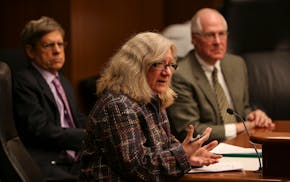Opinion editor's note: Star Tribune Voices publishes a mix of commentary online and in print each day. To contribute, click here.
•••
Brian R. McDaniel made it to two Metallica concerts with his kids last weekend. But he almost didn't because he had a date with something else that sounds like another heavy metal band ― the "widowmaker."
McDaniel, 51, of Lakeville, is a Republican political analyst, lobbyist, podcaster and comic. Thankfully, he's still with us after having had a type of heart attack about a week ago that is sometimes dubbed the "widowmaker." The fearsome appellation is deserved. While all heart attacks are serious, this type is especially perilous because of where it happens: the heart's biggest artery.
No medical degree is necessary to understand why a blockage in a vessel supplying 50% of the heart muscle's blood supply can lead to what medical professionals would politely call an adverse outcome, one that leaves behind a grieving spouse. Some estimates put the survival rate for a heart attack like this at 12% if it happens outside a medical center.
Yet McDaniel is also a walking example of how strides in awareness and treatment can be game-changers. While he'll be taking some new medications and going through cardiac rehabilitation, his stay in the hospital was short and his prognosis is good. A week that began with what doctors call a "big" heart attack ended, amazingly, with McDaniel heading to U.S. Bank Stadium to take in Metallica twice.
McDaniel hopes that others who have a heart attack will be fortunate as he has been, which is why he's sharing his experience. Key points he wants to drive home:
- Trust your instincts that something is wrong.
- Get checked out swiftly by doctors.
Seeking care "is a duty we owe our families and loved ones more than we owe ourselves," he said. "Yeah, the hospital food stinks. Being shaved and hooked up to electrodes stinks. But I can promise you I had more fun this weekend listening to heavy metal than I would have being dead."
McDaniel's message deserves to be amplified. While the COVID-19 pandemic put a powerful spotlight on infectious diseases, heart disease remains the leading cause of death for men and women, according to the U.S. Centers for Disease Control and Prevention (CDC). "In 2022, 702,880 people died from heart disease. That's the equivalent of 1 in every 5 deaths."
Because of McDaniel's public affairs work for health organizations, he was well versed in heart attack risks and symptoms, which include chest pain, a cold sweat, fatigue, nausea, heartburn, dizziness, shortness of breath and pain in shoulder, jaw, arm, back or jaw. He also lost friend and mentor Drew Lee to a heart attack. "I was not blissfully floating through life smoking, drinking hooch and eating burgers without acknowledging the consequences," he said.
Even so, it was a challenge for McDaniel to figure out what has happening. His symptoms didn't fit the heart attack stereotype of clutching your chest and falling to the ground.
He first felt off on the evening of Aug. 11. He and his wife were taking their dog for a walk. After stepping outside, McDaniel said his heart "hurt," he was short of breath and fatigued. They turned back and McDaniel felt better after sitting down, taking antacids and having a glass of milk. He has allergies and wondered if he was affected by "something environmental."
The next day, he went to work. But symptoms returned that afternoon when he walked to his car. They worsened when he tried to mow the lawn. His wife asked, "Are you OK?" and McDaniel replied, "I think you need to take me somewhere."
They went to the hospital, where McDaniel got an angiogram that turned into an angioplasty, a procedure to open the blocked artery.
That medical procedure, along with clot-busting drugs and better awareness are among the reasons why heart attack survivability has dramatically increased in recent decades, according to Dr. Michael Miedema, a cardiologist with Allina Health Minneapolis Heart Institute.
More than 90% of people survive a heart attack, Harvard Health Publishing reported in 2010. Decades ago, up to half of those who had one died within a few days.
But seeking care swiftly is critical for positive outcomes, said Miedema, who is commenting generally on heart health but not directly on McDaniel.
Miedema noted another vital point: the "widowmaker" label might misleadingly imply that only men have this type of heart attack. Women can have one in the same high-risk vessel. They shouldn't delay seeking medical assistance either.
McDaniels said he feels "humbled" by his medical scare and hopes his story can help others. To those who might be reluctant to get checked out, he said "you get no points for being a tough guy" and gutting it out. "Listen to your body," he said, "and know that tomorrow is promised to nobody."

Fierce but compassionate mental health advocate will be missed
Burcum: 'Big Beautiful Bill' takes hatchet to health care
Burcum: 'Why would we make it harder to get help' for addiction?
!["Republicans want to overturn this newfound eligibility [for undocumented immigrants to enroll in MinnesotaCare], which was passed by DFL majorities i](https://arc.stimg.co/startribunemedia/XZLGO62KH5G6DHR55ER5IECZAY.jpg?h=91&w=145&fit=crop&bg=999&crop=faces)
Burcum: Don't rush the decision on undocumented immigrant health coverage


